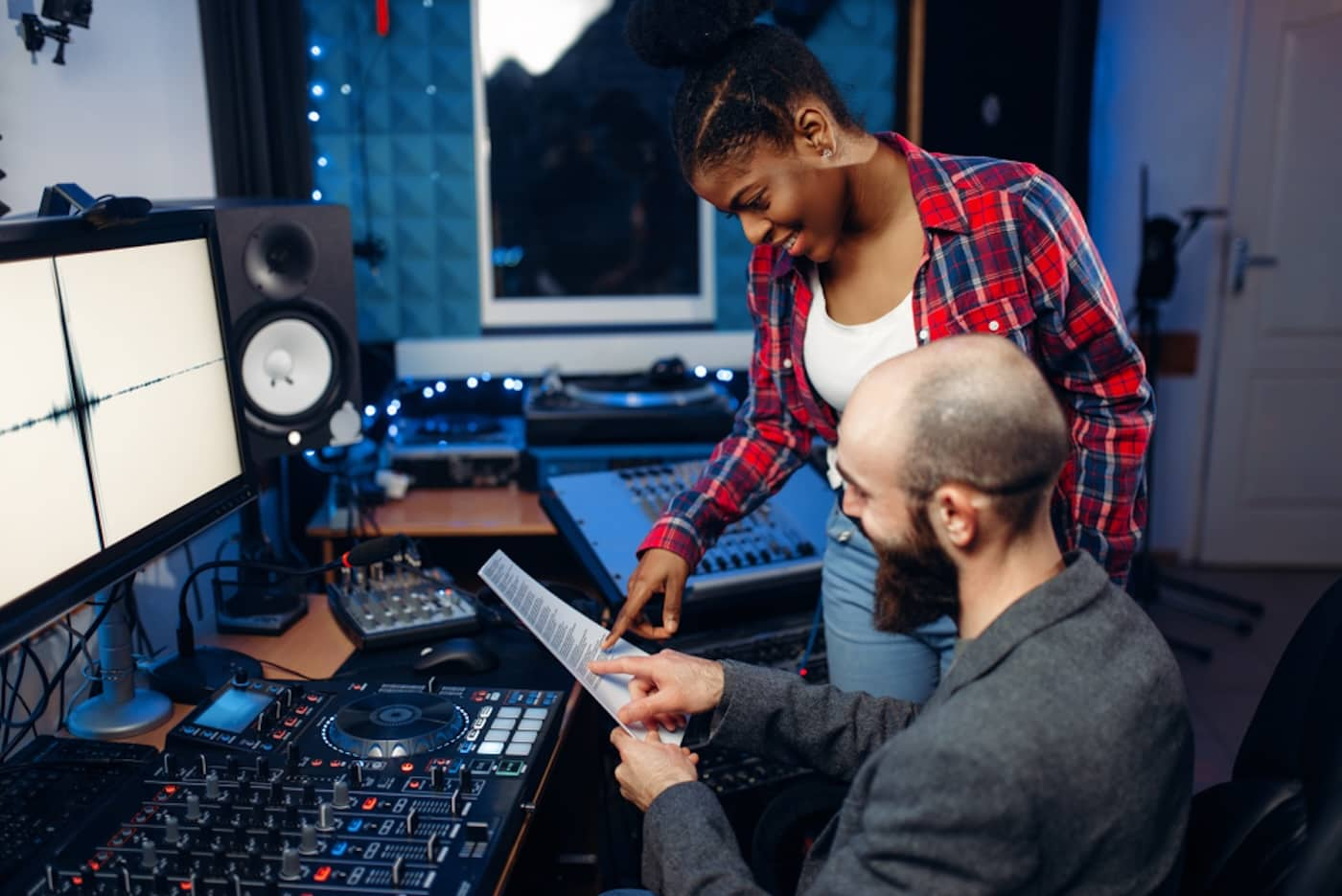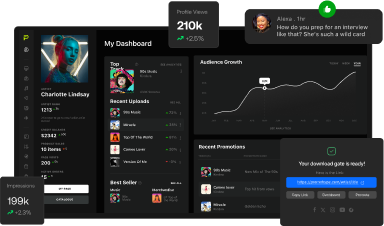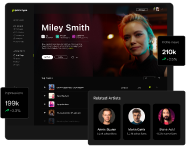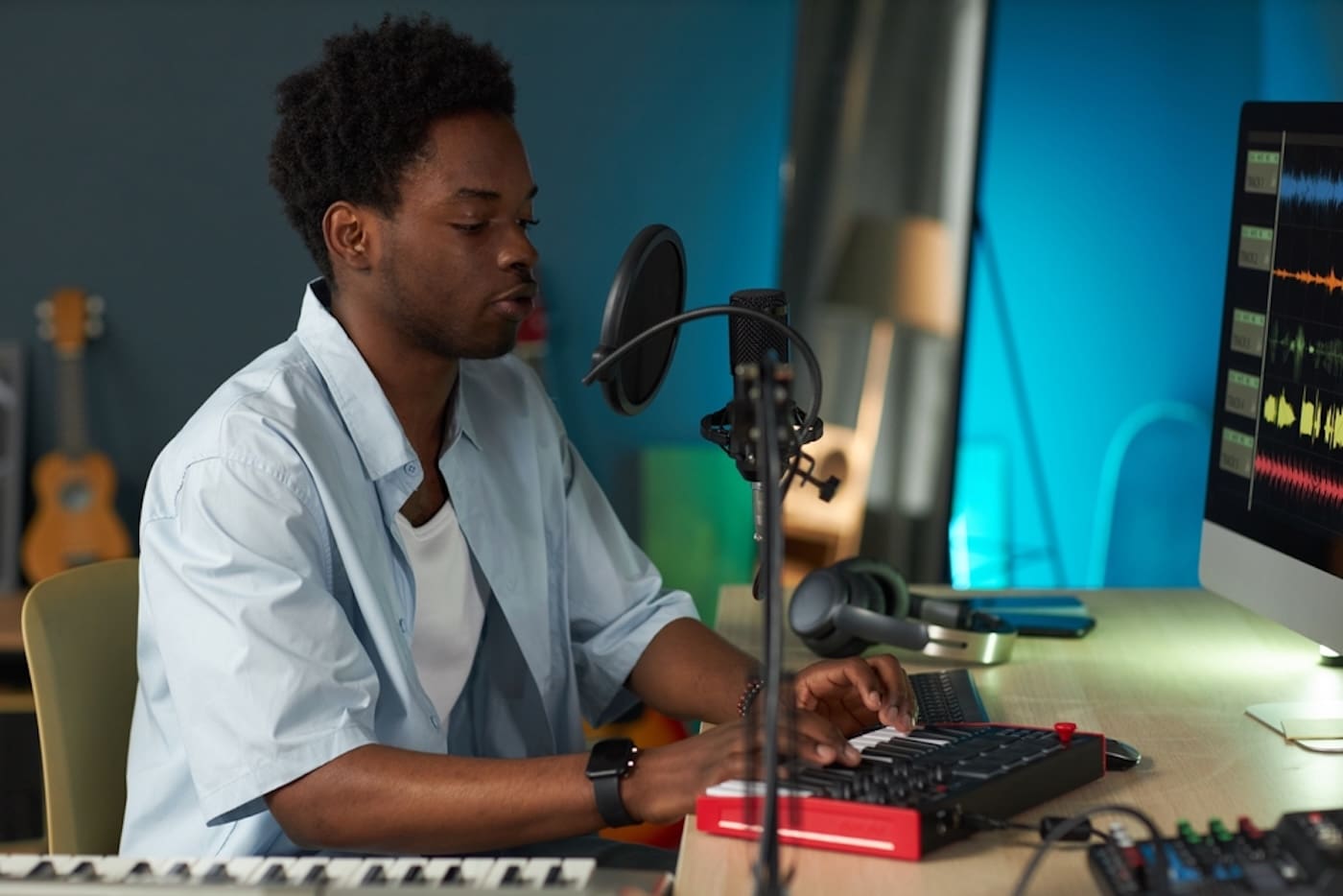
Understanding how to start a music career begins with defining what success means to you.
Whether it’s performing live, building a loyal online audience, or earning a full-time income from your music, clarity provides your career with direction.
Once your goals are set, you can utilize the right tools, strategies, and industry insights to establish a solid foundation for your career.
This comprehensive guide walks you through the key steps to start your music career with confidence and turn your creative vision into measurable success.
Get Early Access
To Promo Hype
Key Takeaways
- A successful music career requires superior musical abilities, making frequent practice sessions essential for independent artists.
- By utilizing automation tools for marketing and distribution, valuable time is saved, allowing for a focus on making new music.
- Creating a distinct brand identity allows artists to separate themselves from other acts in a competitive landscape.
- The music industry is constantly evolving, so staying current with the latest trends will help artists refine their strategy.
- Maximizing your income streams involves adopting a diversified approach to monetization, both online and offline.
How To Start A Music Career In 2025: Step-By-Step
Most artists dream of building a successful music career, but the path can feel overwhelming due to the numerous moving parts involved.
This guide breaks down how to start a music career into clear, actionable steps, helping you cut through the noise and get your music noticed by the right people.
So, without further ado, here’s exactly how to start your music career this year, step by step:
Step 1: Understand The Music Industry
Regardless of the music genre, capturing the attention of music industry professionals is a core goal for most music careers.
This involves understanding the industry’s workings to develop a strategy that effectively showcases your talent to the right people.
Talent scouts from record labels, event booking agents, and publishers all look for certain qualities when considering new artists.
By understanding these qualities, you can create music that stands out among the thousands of releases vying for their attention.
This can be tied to a brand that strengthens your identity, demonstrates value, and increases your chances of getting recognized.
It’s also important to be aware of the business side of the industry, including contractual obligations and revenue-sharing agreements.
Without an artist management team, it can be easy to misunderstand the terms of a contract and the nature of business relationships.
It’s a complex industry with a network of interests, where creators, publishers, and retail and streaming platforms are all interconnected.
Understanding their respective roles and expectations for creative professionals will ensure a smoother music journey and career.
Recommended read: What is an EPK?
Step 2: Define A Successful Career
Every artist has a unique and personal vision of what a successful career looks like and how they can achieve it.
Some artists are all about performance, placing themselves front and center to perform before their fans in bustling venues.
Others focus on making money as a music producer, working behind the scenes to record and edit polished tracks.
Defining what success looks like lays the foundations for building a brand and selecting the tools to achieve your goals.
It allows you to determine the support necessary to fulfill creative visions, setting milestones to gauge your progress.
This definition is also essential for monetization strategies, from collecting music royalties to selling gig tickets and merchandise.
Such strategies can then inform your upcoming release schedules and tour dates, allowing you to focus on writing songs that your fans love.
If you’re focused on offering services like mixing and mastering, creating a business plan will help you assess the viability of your business.
Step 3: Build Your Artist Brand
With stiff competition from other musicians, successful independent artists develop an eye-catching brand around their music.
Whether you’re a solo artist, producer, or band, creating a strong and unique brand represents your core value proposition.
While branding begins with logos and taglines, at its core, it should reflect the values and emotions that drive your music.
These values can be reflected in your logo’s appearance, choice of fonts and colors, and other music marketing assets.
If you don’t have these assets, research the best band websites and see how they capture the spirit of their musical creations..
Once your brand assets are ready, use them consistently across your site, social media, and other promotional channels.
As your artist brand evolves, consider revisiting and refining your brand identity to ensure it accurately reflects your style.
This cohesive approach to brand identity will increase your chances of attracting music publishing interest and furthering your career.
Learn more: How to start producing music.
Step 4: Write & Produce Your Music
Writing and producing a great selection of music sits at the heart of any strategy when launching a music career.
This should be carefully planned out, from your song structure to the instruments and effects used to create a unique sound.
It also means maximizing your time in the recording studio, especially when collaborating with other artists on projects.
You can plan various edits of each track, such as radio-friendly or club-ready extended edits designed for DJing.
Creating separate projects for each version in your music production software will also streamline your workflow and time management.
If you don’t have the funds for professional mastering, the best DAWs include robust tools you can use to do this yourself.
Take the time to learn music production processes, such as applying audio compression, to fine-tune your music ready for distribution.
As your discography expands, you can then decide whether to include it on an album or release it as a one-off single or EP.
Step 5: Release & Promote Your Music
With more music released daily than ever before, creating a clear plan of action for your tracks is essential.
There are several format options to consider when releasing music, beginning with digital downloads and physical media sales.
While these two options are essential, streaming services are also vital for generating consistent income through royalties.
Once you’ve set up your distribution channels, you’ll need to focus on promoting your music to get the audience it deserves.
This can be achieved on a relatively low budget by utilizing your existing social media following to promote directly to fans.
Creating behind-the-scenes videos is a common approach used by producers and bands to share insights into their creativity.
This behind-the-scenes content can be complemented with music videos, which you can share on your YouTube channel.
You can also create paid advertising campaigns to drive additional listeners to your streaming channels or digital downloads.
Before investing in paid campaigns, take the time to create high-quality images and album artwork that captures the viewer’s attention.
Once it’s live, monitor the strategy’s effectiveness through a range of measurable goals that can be tracked using tools.
There are plenty of music marketing resources you can use to streamline the process, such as Chartmetric and Google Alerts.
If you’re confident in your musical abilities, you can also consider submitting music to radio stations to gain exposure.
Get Early Access
To Promo Hype
Step 6: Automate The Business Side
Handling the business side of a music career can be daunting for artists who prefer to focus on songwriting, production, and performing.
Tasks such as trademarking a band name, managing finances, and monitoring royalties can divert focus from creating great music.
While handling the business side is inevitable, numerous small business automation tools can help free up time.
Google Alerts can help with monitoring online discussions, and additional tools are available for automating mailing lists and other processes.
There are also many music marketing tools for creating campaign assets, electronic press kits, and scheduling social media posts.
Once put in place, artists can take a relatively hands-off approach, allowing them to focus on engaging with fans and building rapport.
There are also excellent resources for automating regular uploads across the major music streaming services.
Utilizing a music distribution service can save a significant amount of time managing releases on Spotify, Apple Music, and other platforms.
They also incorporate collection systems for mechanical and performance royalties, enabling you to receive payment for your streams.
Step 7: Hone Your Musical Skills
The artist Picasso once advised other artists to learn the rules like a pro so they can break them as artists.
This mastery of the core skills is vital for artists who want to exceed expectations and push creative boundaries in their work.
Whether you’ve become a music producer or singer-songwriter, professional growth should be a core feature of your music career.
Honing your musical skills can be achieved through self-study or, if time and money permit, by attending a music production school.
If you perform live with musical instruments, setting aside time for regular practice sessions will deliver consistent ongoing improvement.
Alternatively, mastering music theory for producers will ensure a similar positive trajectory in the quality of your tracks.
Those with a home recording studio can refine their processes to achieve better results through more streamlined workflows.
By continually developing your strengths and addressing weaknesses, you can create music that enhances your career.
Read next: How to mix music.
Step 8: Collaborate With Music Producers & Artists
The best music producers understand the importance of collaboration for capturing a broader audience of music fans.
Such collaborations should be a key component of your career plans, whether you’re co-writing songs or producing remixes.
Collaborations enable all parties to tap into collective social media followers, increasing the chances of going viral on TikTok.
They’re also excellent ways to hone your musical skills and develop as an artist through exposure to new songwriting and production techniques.
If you know artists in your genre, consider reaching out to see if they’re interested in collaborating on a new project.
Don’t be afraid to go beyond your inner circle and reach out to singers or producers you admire through their social media pages.
By creating a diverse portfolio of your work, you can also expand your outreach strategy to include publishers and labels working in your genre.
Step 9: Perform Live
Building word of mouth through live performances is a core strategy that all artists use to develop their careers.
If you’re new to the music scene, there are several ways you can get gigs as a musician and reach your intended audience.
Begin by performing at open mics and songwriter nights alongside other musicians to increase your local visibility.
You can use your social media pages to generate buzz; Facebook’s Event page tool is an excellent resource for local gigs.
If you want to attract media attention, consider creating a dedicated electronic press kit to announce upcoming live performances.
By collaborating with other musicians, you can put on live shows that attract a larger audience through your shared fan base.
You can also generate ongoing revenue by recording and selling live performances on digital and physical media.
Step 10: Adapt To New Trends
Being a creative professional means understanding how to effectively utilize tools and resources that can showcase your natural talent.
With today’s rapidly evolving technological landscape, the music industry is entering a crucial period of recalibration.
A wide range of tools, from AI music production to data analytics, is available for up-and-coming producers and songwriters.
If you have the opportunity to attend industry events, take advantage of it to build a professional network and stay up-to-date with new trends.
Such events typically host panels from industry professionals, covering a broad range of valuable topics for new artists.
Music release strategies, advice for hosting live music events, and insights into how industry experts operate are all covered.
These events are also excellent for developing general business skills, ranging from deal negotiation to pitching new project ideas.
By being open and adaptable to new tools, you can streamline the business side and invest time in writing and producing music.
Popular: Music licensing 101.
Music Career Tips
Creating music is a continual learning process, whether using online music production courses or mastering an instrument.
Here are some tips to streamline your career and produce exceptional music that reaches a wider audience.
1. Hire A Vocal Coach
For singer-songwriters, delivering outstanding vocal performances is the key to standing out from the competition.
Hiring a vocal coach enables singers to expand their repertoire across various genres while developing a personalized vocal style.
Breath control, pitch range, articulation, and posture are all taught in music lessons to improve both live and studio performances.
New AI-assisted feedback and reflection tools are also being utilized, altering how singers adjust their singing style.
2. Create High-Quality Cover Art
Strong visuals are crucial for capturing the attention of potential fans and encouraging them to click through to your music.
If you don’t have high-quality artwork, you could be missing out on potential listeners and failing to maximize your engagement.
There are free and affordable design tools available for creating artwork, such as Canva and GIMP, as well as professional tools like Photoshop.
By creating excellent art or outsourcing to designers, you can also use it on band merchandise for additional income.
3. Learn Music Theory
Learning various aspects of music theory is another tried-and-tested method for improving your ability to write and perform music.
Not all music genres require a theoretical understanding of music, but for most artists, this knowledge can be indispensable.
Music theory can help improve your compositions by expanding your options for chord progressions, harmonies, and melodies.
It can also help you articulate your ideas more effectively, moving beyond basic formulas to introduce modulation and complexity.
If you play an instrument and collaborate with other musicians, knowing how to read sheet music is essential for seamless collaborations.
4. Offer Exclusive Content
Exclusivity is a common tactic used by brands to build and strengthen relationships with their core customer base.
Independent artists can utilize this strategy by offering exclusive content, ranging from personalized messages to signed merchandise.
Releasing limited edition EPs and albums on physical formats creates a tangible connection to your music, appealing to collectors.
If you’re using a subscription platform like Patreon, you can offer one-on-one chats with superfans at a pre-determined price.
Career Resources
With multiple overlapping processes to manage, launching a music career demands a meticulous approach to time management.
Fortunately, there are plenty of robust tools and resources you can use to get the ball rolling, including:
- Digital distribution services: Consistently uploading to multiple music streaming services can be time-consuming for independent artists. By using digital distribution services, this process is fully automated, so you can focus on writing new songs.
- Free music production software: There’s an abundance of free music software, like Audacity, which delivers high-quality results. Using these in conjunction with free VST plugins and other resources will keep costs low.
- Music industry resources: The music industry provides various resources to support emerging artists in developing their projects. Explore resources such as BMI’s Spark Program and other specialized tools designed for music creators.
Crowdfunding platforms are also excellent for tapping into your fan base and acquiring funding for upcoming music projects.
Summary
Building a sustainable music career takes time, dedication, and persistence, but the rewards are worth it. With a clear strategy and consistent effort, you can turn your passion into a lasting profession.
This guide lays the foundation for launching your music career, whether you’re taking the independent route or pursuing a label or publishing deal.
As you grow, continue refining your process and exploring tools that simplify your workload, so you can stay focused on creating the music your fans love.
Get Early Access
To Promo Hype
Join Promo Hype






